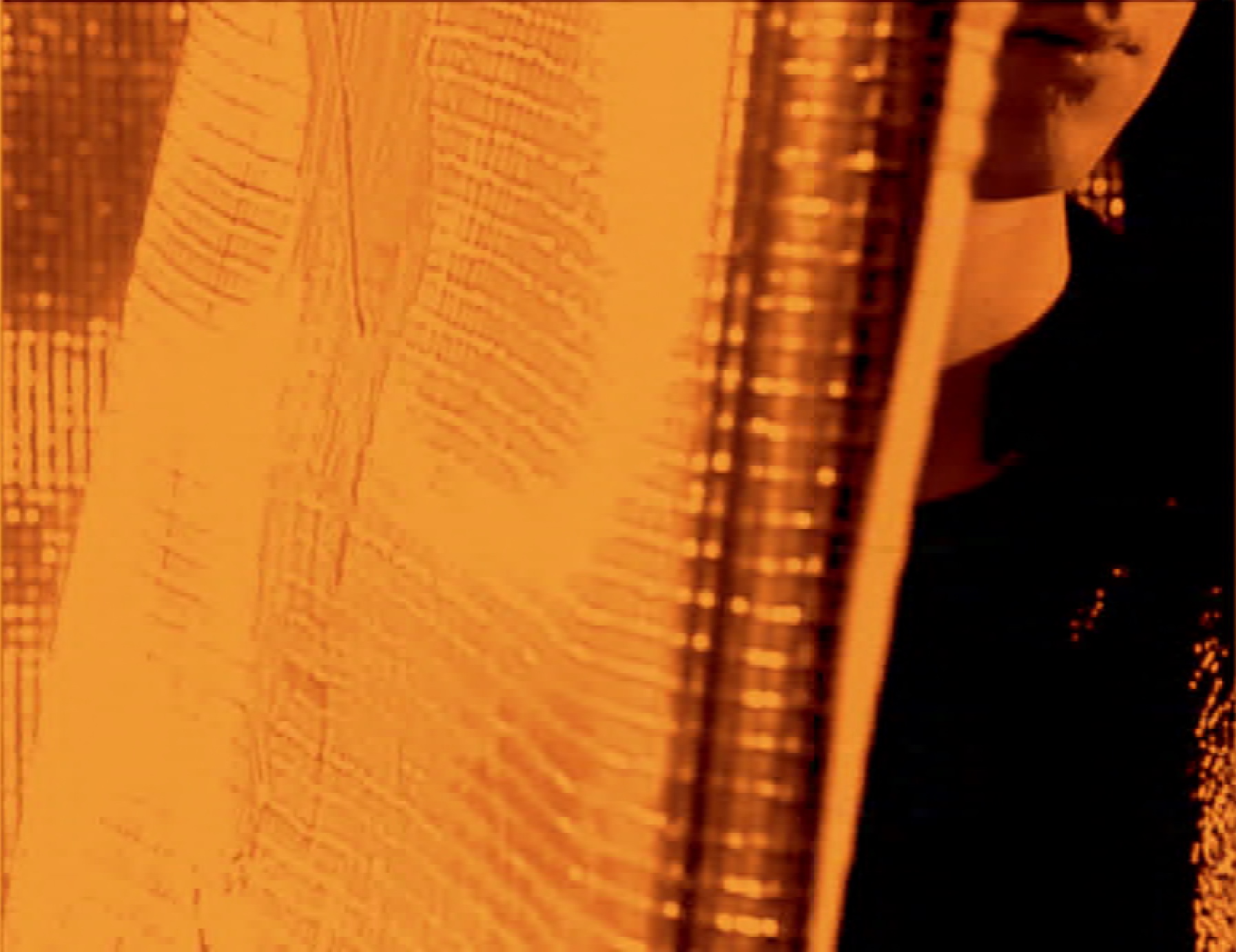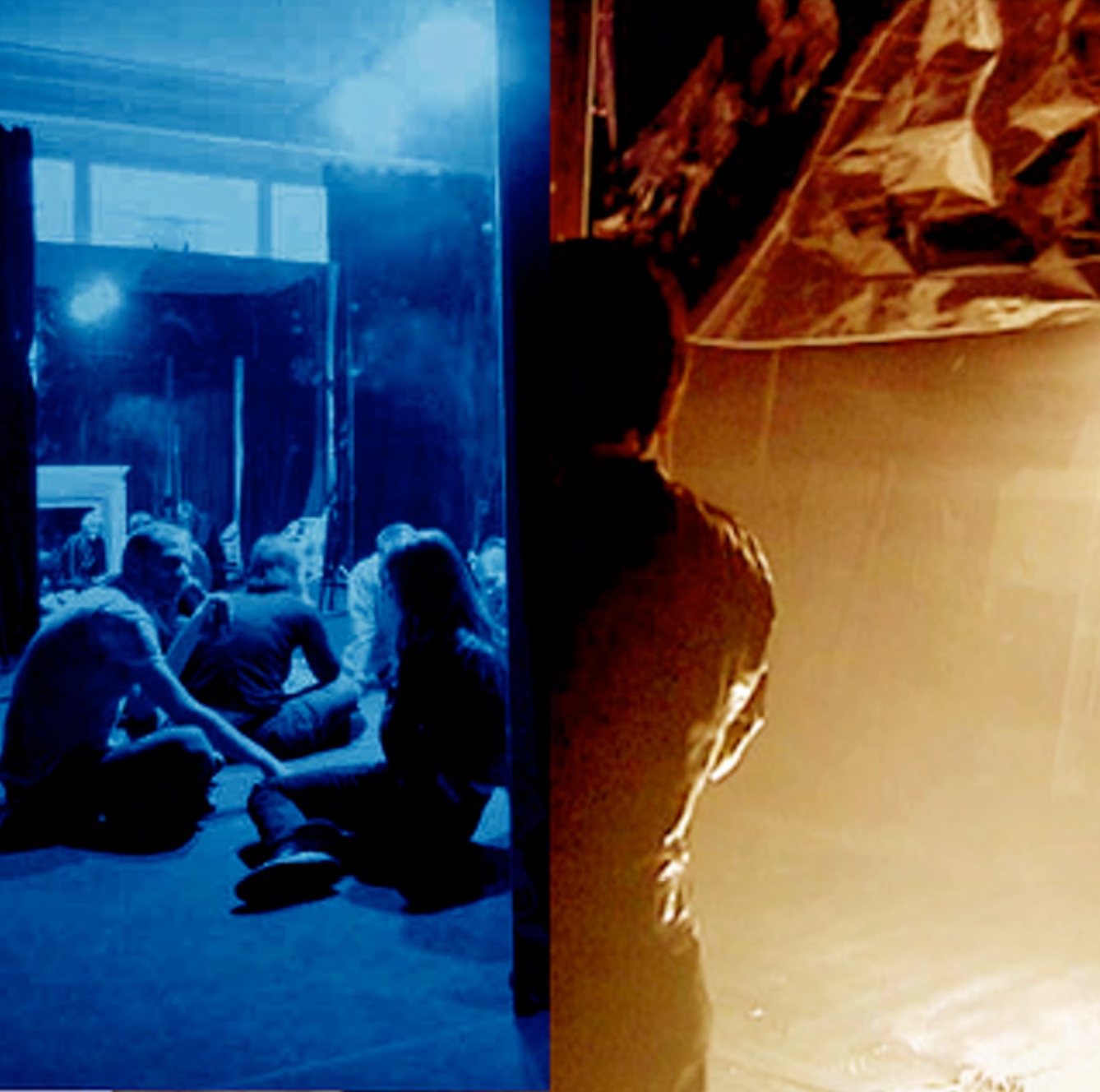The Extras, 2005
Susanne Clausen
#
We are the attendees at an evening party; it is 1969 and we are sitting expectantly, ready to depart, on makeshift benches. We step into a dimly lit motor coach. It is as if we are all feeling the same thing at the same time and are somehow operating in synch. Restrained conversations; waiting for the director. He comes and talks very loudly. Later, in the smoky bar, more waiting, drinking, stamping out cigarette butts with shoes that are too tight. An evening atmosphere. A newspaper seller walks past and says hello; the representatives of the middle classes in glimmering evening dress; our hair curled, slicked with gel; bored, we nosh on our pretzels. Our shoes pinch. Only gradually do we mix with the hippies. They have selected handsome young men with long hair. One of them is describing the scene at the Chinese Tower in the English Garden, of music, girls, a guy who lost it, three people screaming at the same time: “We’re still here, and you have to let us across the border. We will not move until something changes.” They scream until the police intervene and the scene ends by force of arms. We should hit the floor too, cries one, OK and then what? “Do everything in synch. OK, OK.” It is still evening, 1969, our hair is still curled and we drink cocktails. The director screams: “Who hired these idiots?” Loud enough for everyone to hear.

#
The extras have all arrived in the red room. It is 1975. The Committee of the Workers’ Party has also arrived. They have not yet taken their places. They are instructed to wait for the moment; the podium hasn’t been cleaned yet. The ashtrays are full; a red felt cloth is spread over the long table. The spotlights are arranged. A man is sitting at the long table. The podium is too tall; the architect decides that everything has to be redone. The extras wait, drinking beer. A girl pulls on the beard of one of the functionaries. He kicks her roughly in the shin—Stop it, damn it. We wait some more; now everyone is sitting aligned in the long rows of chairs; the functionaries and union representatives have taken their places. Meanwhile thick cigarette smoke is rising from the podium. The annual meeting of the representatives of the Central Committee has begun. The extras are given quiet instructions from behind. From the badly arranged rows of chairs they are trying to get a halfway decent view of the podium. Points are made; decisions are made; salaries are discussed. “It isn’t right that a fireman should earn less than a police officer.” The atmosphere is tense, and the scene has to be repeated five times. “Listen to what they’re saying up there!” In the second-to-last row a man bends over the woman sitting in front of him. He slowly raises her dark blouse, pushes his hand under her shirt, touches her breast. Those of us in the back row struggle not to be noticed. Nevertheless we try to capture the screen quickly with the camera we have hidden in a file folder until now.
#
A scene on a stage. Entry of the highest functionary; he is drunk and falls off the stage. Several delegates are standing on the temporary podium. The portly men in dark suits stand around the microphone until finally a fat, half-bald man with a large birthmark on his forehead presses his way forward, or rather is pushed, groaning. He trembles precariously. Two security guards try to support him. The crowd presses closer and closer. “Comrades, brothers!” he suddenly bellows, and his voice rises dangerously. The fat men in suits sneak glances at one another. The half-bald man with the birthmark takes another precarious marching step forward. But the security guards restrain him. Voices grow louder. Suddenly the man with the birthmark falls forward and collapses into the crowd. The others watch as everything seems to be happening in slow motion. He had fallen from the podium. We thought about how the first cosmonauts returned to earth; we watched them on TV; they were given medals.

#
In the departure hall of an airport. They are standing in the entrance to a hall that looks like the foyer of a cinema, in which a reception is evidently taking place. Three of the walls of the otherwise windowless room are clad in yellow marble; the fourth is entirely covered with a mirror, which makes the hall seem much bigger than it is under the harsh halogen lighting. The extras are chatting quietly and examining the typewritten sheets hung on the walls. A circular hall with white walls is seen. In the middle stands a long wrought-iron chest on which twelve extras in white garments are squatting motionlessly. A gray-haired Japanese man with a powerful build and holding an open bottle of rum takes position before them with his legs spread. After taking a sip from the bottle he snaps his fingers, and the white figures leap from the chest and run in all directions. The chest opens. From inside a black television rises. The next room we enter is called the virtual studio. But the cameras and spotlights are real, and the latter give off a pleasant warmth. The studio is just a large room, with green walls and floor. The extras dressed as farmers wander through the bear room. They begin to chat in a foreign language, but it is difficult to make out what it is.

#
The extras have gathered in the entry hall. They are supposed to look like guests who just happened to have arrived in some intercontinental hotel chain. The production manager takes the remote control and points to the screens and monitors that have already been set up in the hall. Sound effects are played; the monitors begin to flicker rhythmically, but not image appears. The film is a Russian production, and takes place, if we’re not mistaken, in Chechnya. The other groups of extras—parachute jumpers—have been instructed to look back and forth nervously. The production manager switches the recorder to slow motion. Golden whiskey sways sluggishly in our glasses; someone puts a saber to the throat of one of the parachute jumpers; the man makes weak, in articulate sounds. The first group of extras is trying to look uninvolved. Another man in paramilitary dress grabs another man by the arms. Several close-ups follow: the eyes of the parachute jumper, the blade as it as it caresses his taut skin. Suddenly the scene jumps back to the beginning. The saber is pointed at his neck again. The production manager with the remote control grabs his chest. Intense antipathy in the room. “Quiet, quieter, now let the emotion fade again.” The extras concentrate on the spectacle that fades now and again. We wonder whether we remembered to turn off the stove at home.
#
The extras are only very slightly dressed. They are in a magnificently furnished bedroom painted in brown and cream colors. It is 1980. The fireplace is being lit. The men have removed their jackets; all the extras have removed their shoes and are walking barefoot on the cream-colored shag carpet on the bedroom floor. The adjacent room is filled with a strange odor of camphor. It leads to a large living room or reception room in amber. Two men and a woman are seen in the background. Now they are entering the room. The extras are no longer in view. We watch the highly tense mood that results because now it is clear that the woman isn’t wearing anything below her hips. She is wearing a short fur coat. Her lower body is bare. She sways her naked hips. She is also wearing a pair of coarse, black military boots and is pointing her weapon at the floor. Her look is so unusual and provocative that we try to capture it unnoticed with our hidden camera. We move slowly behind the three people, who are absorbed in their conversation. The muted coughing of the extras is heard in the background.
#
The extras assemble behind a projection. The instruction is to move back and forth quietly. The projection of the wall is just large enough for bodies to hide behind it with heads hanging out to the side. The walls are brick red, layered, held from a distance by a steel-tube structure. Behind it are empty Styrofoam cups with leftover coffee and cigarette butts. The extras have to duck. Behind the projection lies Petra von Kant with her female lover on a rustic bed. Wait. More. Repeat. The extras are supposed to remain in position. Her lover says: “We must try to stop the war, if only I knew how. For the Americans it’s all about oil. We are governed by an oil lobby. I tried to participate in all the demonstrations in the city, but I don’t have the time anymore. I feel so weak to start something myself, to organize something, here and now.” Meanwhile Petra von Kant is braiding her lover’s pigtail, as the production manager had instructed her. The production manager deletes the images from the digital camera again; let’s use the cine film. We film directly from the monitor. The extras have to persevere in the corner. Meanwhile Petra von Kant pushes herself slowly out of bed. We try to capture the brief, uncontrolled smile that darts across her face.
#
The extras are supposed to wait on the bow of the ship. They are very handsome. Their muscular upper bodies gleam in the dim light. Finally the first officer raises his hand. Restless, he paces in the upper cabin. The production manager is patient and gives him time. We try to move in parallel with the sailors to the rhythm of the ship’s engine. It is difficult to hear anything at all, as now the noise of the motor drowns everything out. The ship sways; it is driven by a complex construction that was carefully installed in the hall. The rumbling and pounding grows ever louder. “Keep that rhythm, don’t go faster. No one leaves, everyone stays.” Why didn’t we connect the cable? Milk could easily form droplets on the oiled bodies of the young men, we think. Meanwhile something is happening in the upper cabin. Screams, a flash, from out of the trapdoor of the ship’s bow a large, shapeless tangle of wire rises. The extras remove small notebooks and take notes.
︎Video: The Extras, 2005